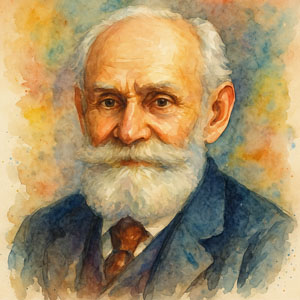~ Ivan Pavlov
 Born in Ryazan, Russia, Ivan Petrovich Pavlov (1849–1936) devoted his life to patient, methodical science.
A pioneer of research on circulation and digestion, he later explored the brain’s
capacity for habit through what he called conditioned reflexes.
Born in Ryazan, Russia, Ivan Petrovich Pavlov (1849–1936) devoted his life to patient, methodical science.
A pioneer of research on circulation and digestion, he later explored the brain’s
capacity for habit through what he called conditioned reflexes.
Pavlov’s careful experiments revealed that, by repeated association, an artificial stimulus could replace a natural one: a ringing bell, over time, could prompt salivation as surely as food. From this, generations learned the foundations of classical conditioning and the power of observation, comparison, and collected facts.
He urged students to embrace demureness and patience—to inure themselves to drudgery and let knowledge accumulate by degrees. In 1904 he received the Nobel Prize in Physiology or Medicine for his work on the physiology of the digestive system.
“Facts are the air of the scientists. Without them you never can fly,” Pavlov said. “Science demands from a man all his life—and if you had two lives, that would not be enough.” His reminder: be passionate and patient in your work... and tireless in your searching.
 Patience. Knowledge grows gradually. 🕯️🔬
Patience. Knowledge grows gradually. 🕯️🔬
